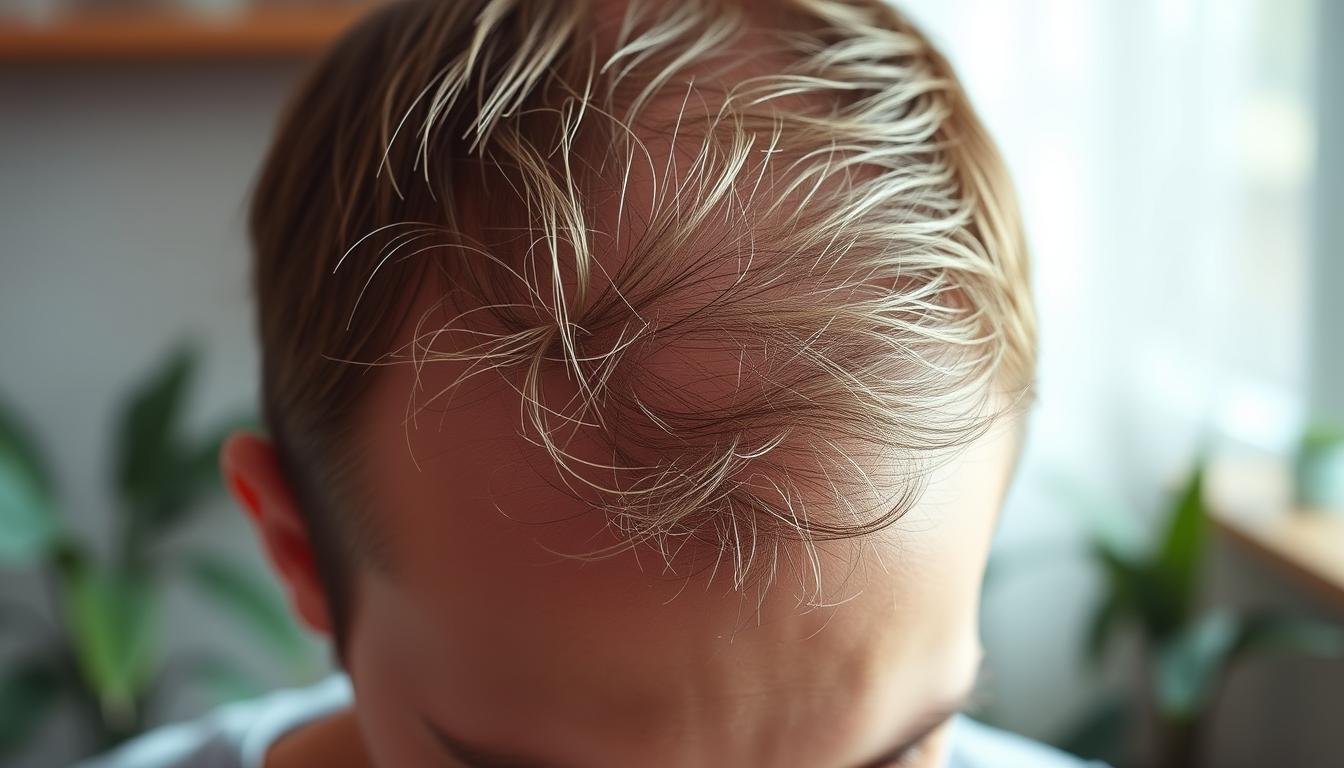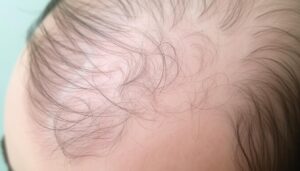Ever looked in the mirror and seen a lot of hair loss at your temples? You’re not alone. Losing hair at the temples is common and can make you feel self-conscious. But there are ways to fix this problem.
Key Takeaways
- Understand the common causes of temple hair loss, including hormonal changes, genetic factors, and lifestyle triggers.
- Gain insights into the connection between temple hair loss and underlying medical conditions.
- Hair loss solution: Scalp Micropigmentation (SMP)
What Does Thinning Temples Look Like?
Hair thinning at the temples can be a concerning issue for many women, leading to feelings of self-consciousness and uncertainty about their appearance. This condition typically presents as a noticeable decrease in hair density at the sides of the forehead, creating a more pronounced space between the hairline and the skin. For females experiencing this type of hair loss, it can be distressing to notice the gradual change. Having hair loss on temples often reveals the underlying scalp more prominently, further emphasizing the thinning areas and potentially altering one’s hairstyle choices.
Lifestyle and Environmental Triggers
Lifestyle choices and environmental factors can also lead to temple hair thinning. Chronic stress, a bad diet, and harsh hair care can weaken hair follicles. Tight hairstyles and too much heat styling can also cause hair loss at the temples. Exposure to pollutants, chemical treatments, or harsh weather can worsen hair loss, including female balding at temples.
Medical Conditions Contributing to Temple Hair Loss
Temple hair loss is a common concern for many individuals, impacting both men and women. This type of hair thinning can often be alarming. Several medical conditions can contribute to this phenomenon, influencing not just the aesthetics of one’s appearance but also overall confidence.
One significant condition that can contribute to temples hair loss is androgenetic alopecia, often referred to as male or female pattern baldness. This hereditary condition affects millions and is characterized by gradual hair thinning, particularly around the temples and crown. In females, hair thinning at the temples can occur as a feathering effect, leading to a widening part or noticeable gaps in hair density.
Additionally, medical conditions like thyroid disorders or autoimmune diseases, such as alopecia areata, can disrupt the normal hair growth cycle, triggering noticeable hair loss at the temples.
Hair Loss Solution: Scalp Micropigmentation
Hair loss can be a distressing experience, particularly when it affects visible areas such as the temples. Many individuals facing hair loss at temples seek effective solutions that can restore their confidence without the need for invasive procedures.
Scalp micropigmentation (SMP) has emerged as a popular option for those looking to address these specific areas of thinning hair. This innovative, non-surgical treatment creates the illusion of a fuller head of hair by depositing tiny inkdots into the scalp, mimicking the appearance of hair follicles.
One of the primary advantages of SMP is its versatility, allowing it to be tailored to suit various stages and patterns of hair loss. For instance, individuals experiencing temple hair loss can benefit greatly from the treatment, as it not only conceals the thinning areas but can also redefine the hairline for a more youthful appearance.
The process is relatively quick and can often be completed in just a few sessions, making it an attractive option for those looking for effective results without a lengthy recovery time.
Conclusion
Hair loss at the temples can be a frustrating and emotional experience, but understanding its causes and exploring effective solutions can make all the difference. From addressing lifestyle factors to considering medical conditions, there are many ways to take control of your hair health. If you’re looking for a proven and non-invasive solution, Scalp Micropigmentation (SMP) offers a transformative way to restore confidence and redefine your look.
Come visit us at ScalpMasters, where we are committed to helping you regain your confidence with personalized SMP treatments tailored to your needs.
Don’t let temple hair loss hold you back—contact us today to schedule a consultation and learn how we can help you achieve a natural, fuller appearance.











